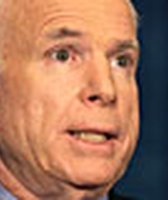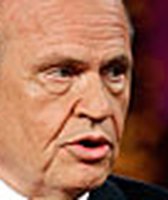Stand up for the facts!
Our only agenda is to publish the truth so you can be an informed participant in democracy.
We need your help.
I would like to contribute
SUMMARY: The Republican candidates for president each offer voters conservative credentials and significant flaws in their records.
So you're looking for the true conservative, the total package of fiscal restraint and moral rectitude, the man who makes you turn to the bedside portrait of Ronald Reagan and say, "You'll always be the one. But I know you'd want me to be happy."
It has been a difficult search and, by most accounts, remains so. When the Republican candidates for president gather Wednesday, Nov. 28, 2007 in St. Petersburg for the CNN/YouTube debate, each will be vying for the love of the conservatives who dominate the GOP's primaries and caucuses, which begin in barely six weeks.
So what's your type? A churchy family man, antiabortion and anti-gay marriage, a teetotaling minister with a license to pack heat? Get Mike Huckabee's number.
But keep in mind: As governor of Arkansas, Huckabee did something no true conservative should ever do, even with God on his side.
How about a proven law-and-order man? A rough 'em-and-cuff 'em former prosecutor who figures law-abiding citizens shouldn't mind being stopped and frisked. Let the civil libertarians cry in their lattes; Rudy Giuliani tamed New York.
But wait, that picture — is that him in a dress?
Perhaps a jowly, amiable ex-senator with a Southerner's healthy distrust of the federal government. Fred Thompson is winking from across the room.
Then again, should social conservatives really trust states to police the nation's morals? Isn't that what the presidency is for?
Maybe it's Mitt. Constitutional amendment to ban gay marriage? Check! Abortion? Seen the light! Plus Gov. Romney is a businessman — rescued the Olympics, turned a rat hole into a profit. Washington could use a dash of Wall Street.
But remember: When he ran for governor of Massachusetts, Romney backed abortion rights. Then there's John McCain and Ron Paul, Tom Tancredo and Duncan Hunter. Each claims to be the true conservative, too.
So who's the real Mr. Right?
It depends on how you judge conservative.
By the company they keep?
If one could be judged conservative by association, then each of the leading Republicans would be golden. Leading up to the debate, the candidates have been touting endorsements from prominent conservative leaders.
But the list may say more about the fractured state of the right — and the uncertainty of the outcome of the Republican race — than about who's the true conservative.
"I don't think conservatives are divided about the end goal," said Ken Connor, chairman of Center for a Just Society, a religious rights group based in Washington, and a longtime player in conservative politics nationally and in Florida. "There is a division of the house on the best means to that end."
Thompson: Anointed Nov. 13 by the National Right to Life Committee, the nation's largest and most politically powerful anti-abortion group with 3,000 chapters in 50 states.
Mitt Romney: Endorsed Nov. 5 by Paul Weyrich, co-founder of the Moral Majority and founding president of the Heritage Foundation, an influential conservative think-tank.
Rudolph Giuliani: Endorsed Nov. 7 by Pat Robertson, the religious broadcaster who ran for president in 1988.
Mike Huckabee: Endorsed Nov. 8 by Donald Wildmon, founder of the American Family Association, which boasts a 3-million-strong mailing list and owns some 200 radio stations. The group frequently boycotts corporations for what it deems pro-gay or anti-Christian policies.
John McCain: Endorsed by Sen. Sam Brownback, R-Kan., a favorite of religious conservatives who dropped out of the race. Fervently antiabortion and anti-embryonic stem cell research, Brownback also pushed Congress to intervene in the end-of-life case of the late Terri Schiavo, the brain-damaged Pinellas County woman.
By what they've done right?
For all the trash-talking among the Republican candidates about each other's leftist tendencies, they all boast conservative bona fides, based on their past records and statements. But often they represent different corners of the conservative movement.
Thompson: As a senator from 1994 to 2002, he consistently voted to limit abortion, even when the health of the woman is at stake. He was a reliable vote for tax cuts, free trade, and letting law enforcement more easily spy on suspected terrorists, Senate roll call votes show. He always voted against gun control.
In 2002, he bucked President Bush and voted against a popular program that was anathema to fiscal conservatives: Adding prescription drug coverage to Medicare.
McCain: The only combat veteran in the race and the top Republican on the Senate Armed Services Committee, McCain is unmatched in his experience in national defense.
He has staunchly supported staying in Iraq, despite the war's growing unpopularity. He warned as early as 2003 that America needed to send more forces, and supports expanding the military. He, too, has a conservative voting record after 21 years in the Senate, where he's known for crusading against federal spending and "earmarks," the hometown goodies that members of Congress stuff into spending bills.
He consistently votes against abortion and gun control, and has generally supported President Bush's tax cuts.
Romney: The Republican Party has long been a friend of business, and none in the field has more business experience. After a successful career as a management consultant and co-founder of Bain Capital, he was tapped to rescue the 2002 Winter Olympics in Salt Lake City.
His pro-business record followed him to the governor's mansion of Massachusetts, where he turned a $3-billion budget shortfall into balanced budgets for four straight years. On the stump, he says he would like to overturn Roe v. Wade, the Supreme Court decision requiring states to permit abortion. He says he supports a constitutional amendment banning gay marriage.
Huckabee: In terms of religious philosophy, this former Southern Baptist minister is right in line with the white, evangelical Protestants who make up a healthy chunk of the Republican electorate.
He is consistent, too, opposing abortion and gay marriage throughout his public life. He supports gun rights and has bragged of being the first governor with a license to carry a concealed weapon.
When he left office after 10 years as governor, Arkansas had an $850-million budget surplus, which he urged should be returned to taxpayers as rebates.
Giuliani: As mayor of New York from 1994 through 2001, he cut taxes, joined the national trend of trimming welfare roles, and slowed city spending.
At a time when most big city mayors were doing little new about crime, Giuliani won praise from conservatives for aggressively attacked it. He increased the size of the New York City Police Department and instituted a policy called Stop and Frisk, which encouraged officers to stop passers-by who looked suspicious.
As a candidate for president, he has promised to appoint "strict constructionists" to the federal court, a term conservatives use for jurists who narrowly interpret the Constitution and won't "legislate from the bench." A strict constructionist, conservative scholars insist, wouldn't abide Roe v. Wade.
Or by what they haven't done right?
There's a reason many socially and fiscally conservative leaders who usually splash about in the mud of politics have kept their boots dry this time, and why consensus has been slow to emerge. For everything conservatives might love about each candidate, there's something they can't stand.
Huckabee: Raised taxes, raised taxes, raised taxes. When he was governor, Arkansas raised taxes on tobacco, nursing home beds and other things. Huckabee pushed for a 1-cent hike in the state sales tax for education.
According to an analysis by the Club for Growth, a conservative Washington group that advocates low taxes and low spending, the per capita tax burden in Arkansas rose by 47 percent during Huckabee's 10-year tenure, from 1996 through 2006.
Huckabee counters that he cut taxes and fees nearly 100 times, but those don't come close to offsetting the taxes he and the Democratic-led legislature raised.
McCain: Despite his overall conservative record, McCain has had a prickly relationship with the right wing of the Republican Party.
He irked antiabortion forces with his dogged support for lifting President Bush's restrictions on federal funding for embryonic stem cell research, and got on the right's bad side by calling Robertson and Jerry Falwell "agents of intolerance" in the 2000 election.
McCain opposed renewing Bush's tax cuts in 2003, saying it was fiscally inappropriate during war, though he changed his position in 2006.
More significantly, he was the author of the landmark 2002 campaign finance overhaul known as the McCain-Feingold bill, which limits unregulated contributions to political parties.
Many conservative interest groups, from the National Right to Life Committee to Americans for Tax Reform, believe it limits their influence.
But the sin freshest in the minds of many conservatives was McCain's support this year for a immigration reform, supported by President Bush, that would given some 12-million illegal immigrants a route to legal status.
McCain admits the backlash surprised him. He's now telling Republican voters he realizes the nation must first stop illegal immigration before tackling other changes.
"I understand why you would call it a, quote, shift," McCain told reporters in South Carolina this month. "I say it is a lesson learned about what the American people's priorities are."
Romney: Despite assurances that he has undergone a conversion, his past is proving tough for many conservatives to reconcile.
In 2002, when he was running for governor of Massachusetts, Romney filled out a questionnaire for the Planned Parenthood Advocacy Fund of Massachusetts that still haunts him today:
Does he support Roe v. Wade? Yes.
Does he support access to "emergency contraception," often known as the morning-after pill? Yes.
In 1994, as a candidate for the U.S. Senate, Romney supported the Brady Bill, which required background checks for gun purchases, as well as a ban on certain assault weapons. During his successful run for governor in 2002, Romney told reporters, "We have tough gun laws in Massachusetts; I support them."
Thompson: His biggest flaw among conservatives is his conservative philosophy about the role of the federal government.
As a senator, Thompson consistently voted against measures expanding Washington's reach into local and state affairs, and he has continued to maintain those federalist views despite complaints from social conservatives.
He opposes abortion, but he does not support a constitutional amendment banning abortion nationwide – part of the Republican platform for a quarter century. He says the decision should be left to the states. Same with gay marriage.
"Sometimes states have a right to do the things that even Fred Thompson disagrees with," he told the Associated Press in response to grumbling over his endorsement by the National Right to Life.
But Connor, chairman of the Center for a Just Society, said the desire of many conservatives for a less intrusive federal government doesn't extend to hot cultural issues like abortion and gay rights.
"For most pro-lifers, leaving abortion to the states is no more acceptable than leaving racial discrimination up to the individual states, or the right of women to vote," Connor said.
Giuliani: He has the most explaining to do. As mayor of New York, he backed tougher gun laws and sued the gun industry, and complained about states with lax restrictions for flooding his city's streets with firearms.
He supports Roe v. Wade and has advocated for gay rights. He once donated money to Planned Parenthood. He is on his third marriage. And as mayor, he told illegal immigrants they were welcome, as long as they worked hard and contributed to society.
The last time the Republican slate was unsettled, in 2000, Tony Perkins endorsed Gary Bauer, a staunch social conservative. This year, Perkins, who runs the Family Research Council, an influential conservative policy outfit in Washington, says he's talking with all the Republicans, but he doesn't plan to endorse one.
"If you could do a mix and match among the candidates, you could probably create a perfect candidate within the mix," Perkins said. "But unfortunately that's not possible."
Our Sources
Congressional Quarterly, member profiles, key votes, Sens. Fred Thompson and John McCain. Interview with Ken Connor, Center for a Just Society, Nov. 21, 2007
Interview with Tony Perkins, president, Family Research Council, Nov. 20, 2007
Interview with David O'Steen, executive director, National Right to Life, Nov. 16, 2007
Project Vote Smart interest group ratings , Sen. Fred Thompson.
National Right to Life Committee, 105th Congress scorecard .
National Right to Life Committee, 106th Congress scorecard .
National Right to Life Committee, 107th Congress scorecard .
NBC's Meet the Press with Tim Russert, interview with Fred Thompson , Nov. 4, 2007.
Interview, Angus McQuilken, vice-president for public affairs, Planned Parenthood Advocacy Fund of Massachusetts, Nov. 16, 2007
Arkansas News Bureau, Huckabee supports 'castle doctrine' law , Jan. 5, 2006.
Club for Growth Tax Hike Mike
Mike Huckabee campaign Press Release: Mike Huckabee's Campaign Manager Speaks Out Against Club for Growth Ad, Aug. 2, 2007
Arkansas Democrat-Gazette 10-year record on taxes studied 2007
Arkansas News Bureau Huckabee Endorses Tax Rebates 2006
Arkansas Democrat-Gazette, "Senate OKs last of 5 tax bills, Income-levy relief wraps up package" March 1, 2007
CQ interview, Whitney McLaughlin, Arkansas Department of Finance and Administration, Nov. 14, 2007.
CQ interview, Mike Stormes, budget administrator for the Arkansas Department of Finance and Administration, Nov. 14, 2007.
Interview with Stephen Slivinski, Director of Budget Studies at the Cato Institute
Cato Institute Fiscal Policy Report Card for America's Governors 2006
Cato Institute Fiscal Policy Report Card for America's Governors 2004
Cato Institute Fiscal Policy Report Card for America's Governors 2002.
Cato Institute Fiscal Policy Report Card for America's Governors 2000.
Cato Institute Fiscal Policy Report Card for America's Governors 1998.
Cato Institute Fiscal Policy Report Card for America's Governors 1998.
Cato Institute Fiscal Policy Report Card for America's Governors 1992.
The Tax Foundation State and Local Tax Burdens Compared to Other U.S. States .







































